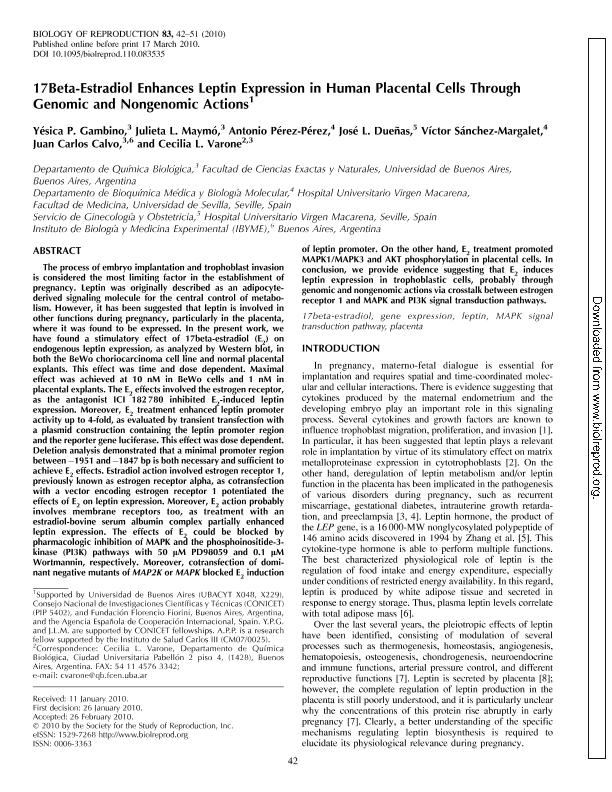Artículo
17Beta-estradiol enhances leptin expression in human placental cells through genomic and nongenomic actions
Gambino, Yésica Paola ; Maymo, Julieta Lorena
; Maymo, Julieta Lorena ; Pérez Pérez, Antonio; Dueñas, José L.; Sánchez Margalet, Víctor; Calvo, Juan Carlos
; Pérez Pérez, Antonio; Dueñas, José L.; Sánchez Margalet, Víctor; Calvo, Juan Carlos ; Varone, Cecilia Laura
; Varone, Cecilia Laura
 ; Maymo, Julieta Lorena
; Maymo, Julieta Lorena ; Pérez Pérez, Antonio; Dueñas, José L.; Sánchez Margalet, Víctor; Calvo, Juan Carlos
; Pérez Pérez, Antonio; Dueñas, José L.; Sánchez Margalet, Víctor; Calvo, Juan Carlos ; Varone, Cecilia Laura
; Varone, Cecilia Laura
Fecha de publicación:
07/2010
Editorial:
Society for the Study of Reproduction
Revista:
Biology of Reproduction
ISSN:
0006-3363
Idioma:
Inglés
Tipo de recurso:
Artículo publicado
Clasificación temática:
Resumen
The process of embryo implantation and trophoblast invasion is considered the most limiting factor in the establishment of pregnancy. Leptin was originally described as an adipocyte-derived signaling molecule for the central control of metabolism. However, it has been suggested that leptin is involved in other functions during pregnancy, particularly in the placenta, where it was found to be expressed. In the present work, we have found a stimulatory effect of 17beta-estradiol (E2) on endogenous leptin expression, as analyzed by Western blot, in both the BeWo choriocarcinoma cell line and normal placental explants. This effect was time and dose dependent. Maximal effect was achieved at 10 nM in BeWo cells and 1 nM in placental explants. The E 2 effects involved the estrogen receptor, as the antagonist ICI 182 780 inhibited E2-induced leptin expression. Moreover, E2 treatment enhanced leptin promoter activity up to 4-fold, as evaluated by transient transfection with a plasmid construction containing the leptin promoter region and the reporter gene luciferase. This effect was dose dependent. Deletion analysis demonstrated that a minimal promoter region between - 1951 and -1847 bp is both necessary and sufficient to achieve E2 effects. Estradiol action involved estrogen receptor 1, previously known as estrogen receptor alpha, as cotransfection with a vector encoding estrogen receptor 1 potentiated the effects of E2 on leptin expression. Moreover, E2 action probably involves membrane receptors too, as treatment with an estradiol-bovine serum albumin complex partially enhanced leptin expression. The effects of E2 could be blocked by pharmacologic inhibition of MAPK and the phosphoinositide-3-kinase (PI3K) pathways with 50 μM PD98059 and 0.1 μM Wortmannin, respectively. Moreover, cotransfection of dominant negative mutants of MAP2K or MAPK blocked E 2 induction of leptin promoter. On the other hand, E2 treatment promoted MAPK1/MAPK3 and AKT phosphorylation in placental cells. In conclusion, we provide evidence suggesting that E2 induces leptin expression in trophoblastic cells, probably through genomic and nongenomic actions via crosstalk between estrogen receptor 1 and MAPK and PI3K signal transduction pathways. © 2010 by the Society for the Study of Reproduction, Inc.
Archivos asociados
Licencia
Identificadores
Colecciones
Articulos(IQUIBICEN)
Articulos de INSTITUTO DE QUIMICA BIOLOGICA DE LA FACULTAD DE CS. EXACTAS Y NATURALES
Articulos de INSTITUTO DE QUIMICA BIOLOGICA DE LA FACULTAD DE CS. EXACTAS Y NATURALES
Citación
Gambino, Yésica Paola; Maymo, Julieta Lorena; Pérez Pérez, Antonio; Dueñas, José L.; Sánchez Margalet, Víctor; et al.; 17Beta-estradiol enhances leptin expression in human placental cells through genomic and nongenomic actions; Society for the Study of Reproduction; Biology of Reproduction; 83; 1; 7-2010; 42-51
Compartir
Altmétricas



